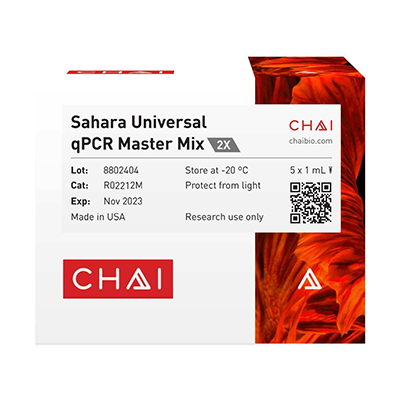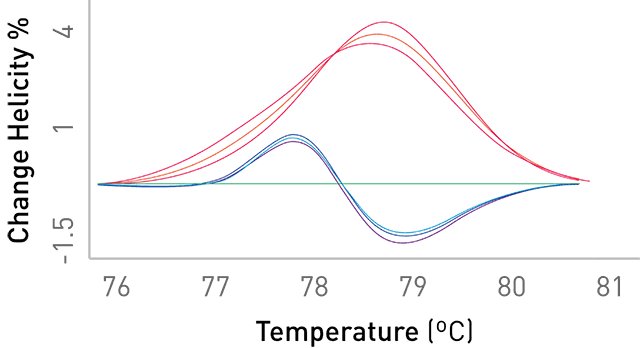The Advantages of Thermal Stability
Chai master mixes are designed to be stable at 25 ºC for at least four weeks, with some lasting three months. High-stability mixes offer two key benefits:
Chai’s versatile mixes are ready for anything, giving reliable results from the most complex experiments and most difficult samples
Stable weeks to months at 25 ºC, Chai mixes ship economically around the world without ice
UNG carry-over prevention system stops contamination from prior runs from producing false results
Perform direct PCR from difficult samples like blood, food, environmental water, and more
Incorporate Chai mixes in your commercial or diagnostic test kits, royalty-free
DNA detection with Real-Time PCR
For probe-based detection of DNA
Starting at $105 (2 x 1 mL) View Details
For dye-based detection of DNA with brilliant melt and HRM curves
Starting at $122 (2 x 1 mL) View Details
For probe-based detection of DNA
Starting at $105 (2 x 1 mL) View Details
For dye-based detection of DNA with brilliant melt and HRM curves
Starting at $122 (2 x 1 mL) View Details
RNA detection with Real-Time RT-PCR
For probe-based detection of RNA in simple one-step reactions
Starting at $219 (2 x 1 mL) View Details
For probe-based detection of RNA while preventing false positives due to carry-over contamination
Starting at $297 (2 x 1 mL) View Details
For probe-based detection of RNA in simple one-step reactions
Starting at $219 (2 x 1 mL) View Details
For probe-based detection of RNA while preventing false positives due to carry-over contamination
Starting at $297 (2 x 1 mL) View Details
Chai master mixes are designed to be stable at 25 ºC for at least four weeks, with some lasting three months. High-stability mixes offer two key benefits:

Master mix degradation is a leading cause of inconsistent Cq values in PCR. Most commercial master mixes are stable in the freezer but start to degrade the moment they’re taken out.
When large plate-based experiments can take over an hour just to set up, it can be hard to control for the effects of enzyme degradation.
With our unique temperature stability and aptamer-based hot start, reactions can be set up without ice or other headaches. This also helps reduce waste in cases when mixes are left out during lunch or even overnight. Chai mixes can undergo 20 freeze/thaw cycles with no degradation, eliminating the need for extensive aliquoting. If you do store your mixes at 4 ºC, they’ll be stable for six months.
Chai master mixes’ high stability also helps make shipping more economical and reliable. It avoids the cost and weight of ice packs, while preserving performance during shipping delays. Our Sahara master mixes, which are stable for three months at 25 ºC–and eight straight days at 50 ºC–can be a huge help for researchers in remote locations without reliable cold chain, shipping, or refrigeration.
Chai’s Sahara Universal qPCR Master Mix gives consistent Cq values even after eight days at 50 ºC
Chai’s master mixes provide extraction-free PCR from “dirty” samples like blood, saliva, food & beverage, and environmental water.
By using biochemistry to overcome common inhibitors, Chai master mixes eliminate the need for costly, time-consuming purification steps like spin columns.
Inhibition-tolerance also provides better research results, preventing residual inhibitors that cause variability even with cleaner samples.
Chai Green binds to DNA’s minor groove, making it vastly less inhibitory than dyes such as SYBR Green I. This allows use at much higher concentrations, giving you brilliant melt curves and HRM curves that can be used to identify individual SNPs.

A class 4 SNP genotyped using Chai Green qPCR Master Mix. Wild type, homozygous, and heterozygous variants were easily differentiated via HRM, despite a Tm difference of only 0.2 ºC.
PCR is remarkably sensitive, making it incredibly easy for the amplicons produced by one PCR reaction to contaminate the next. This can cause false positives or amplification of NTC controls.
To avoid this, labs traditionally use a unidirectional workflow: setting up PCR reactions in one area, running PCR in another, and ideally placing PCR instruments under negative pressure. However these extra steps are impractical for many labs.
Chai’s UNG Carry-over Protection system provides an easier, more reliable alternative. By substituting dTTP with dUTP, amplicons can be differentiated from actual targets. If contaminated amplicons do make their way into a future PCR reaction, they will be digested by an Uracil N-glycosylase (UNG) enzyme, preventing it from being amplified and producing a false signal.
Chai’s master mixes may be freely incorporated into test kits or used in other OEM applications. There are no contracts to sign or royalties imposed for any application, and bulk quantity prices are transparently shown on our product pages.